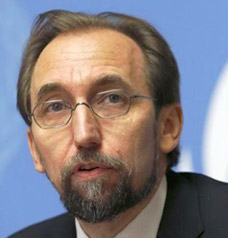|
Two constitutionally-backed truth seeking
commissions:
Four-tier domestic mechanism mooted
by Manjula Fernando
The ICRC has been consulted to set up a
permanent office on disappearances. A judicial mechanism comprising
legal experts will be set up to carry out criminal investigations over
alleged war crimes, under the second tier. The composition of the
judicial mechanism will be agreed upon through a consultancy process
that will be carried out between mid October to January end among all
stakeholders.
 |
|
OHCHR High Commissioner,
Zeid Ra’ad Al Hussein |
The Government may look beyond the South African model of Truth and
Reconciliation to a more significant model in Gambia, in its quest to
initiate an accountability and healing mechanism to pacify the
international community.
Foreign Minister Mangala Samaraweera, outlining the government's
intentions last week, a day prior to a joint media briefing by President
Maithripala Sirisena and Prime Minister Ranil Wickremesinghe, during
which the Foreign Minister's sentiments were echoed and said the South
African model was 'somewhat dated' and they might also look at other
models such as the one used in Gambia, where different communities sat
down to sort out their differences.
He added that the Special Hybrid Court proposed by the Office of the
High Commissioner for Human Rights (OHCHR) and the domestic mechanism
which Sri Lanka wants to set up with international assistance differed
only 'slightly'.
"The prosecutors and judges are what have to be finalised. We have
slight differences in opinion as to how it should be done, but I think
after consultations, we could find a point of convergence," the Minister
said.
"The burden of the criminal investigation is on Sri Lanka, which was
'good' because the government did not want outsiders to handle it," he
said. Minister Samaraweera said the OHCHR has been 'very balanced in
reporting the excesses of the LTTE'.
The Government has proposed a four-tier domestic mechanism, which may
also be highlighted in the consensus resolution to be moved at the Human
Rights Council by the US on September 24 or 25, to address the issues
highlighted in the OHCHR report.
There will be two constitutionally-backed truth seeking mechanisms,
one headed by religious leaders representing all leading religions - a
compassionate council and another headed by commissioners.
Victims who lack physical evidence to prove their cases in a court of
law could refer to these mechanisms for redress. According to the
Minister, South African expertise will be sought in putting together
these two commissions.
Meanwhile, the ICRC has been consulted to set up a permanent office
on disappearances.
A judicial mechanism comprising legal experts will be set up to carry
out criminal investigations over alleged war crimes, under the second
tier.
The composition of the judicial mechanism will be agreed upon through
a consultancy process that will be carried out between mid October to
January end among all stakeholders.
The third tier would be the setting up of a special office of
reparation, to handle compensation to victims.
This office will address cases referred to them by the other
mechanisms such as truth seeking, justice and reconciliation.
Minister Samaraweera said the fourth tier would be the most important
and it will strive to ensure that past mistakes that led to two violent
insurgencies in the south and a devastating war in the North would not
be repeated.
This mechanism will focus on introducing legal provision and other
instruments to prevent a recurrence of violence. A key element of this
proposal, is addressing grievances of minority communities within a
framework of an undivided Sri Lanka.
The Government is expected to initiate the consultancy process with
all stakeholders including victims and civil society, shortly after
President Maithripala Sirisena's return from the UN General Assembly
this month in New York.
The Minister said this will not be a process to hunt down war heroes
but rather an effort to redeem their good name. "There will be no cover
up. What is more important is the command structure."
He added that he would like to travel to Geneva again, not to attend
the Human Rights Council Sessions but on vacation hinting that Sri
Lanka's Permanent Representative Ravinatha Aryasingha might look after
the country's interests when the US resolution on Sri Lanka is moved in
the Council somewhere next week.
Aryasingha may also head the Lankan delegation when the OHCHR's
report on Sri Lanka, which was made public, at a press conference held
by the High Commisioner, Zeid Ra'ad Al Hussein in Geneva last Wednesday,
will be tabled in the Council on September 30 followed by discussions.
|

